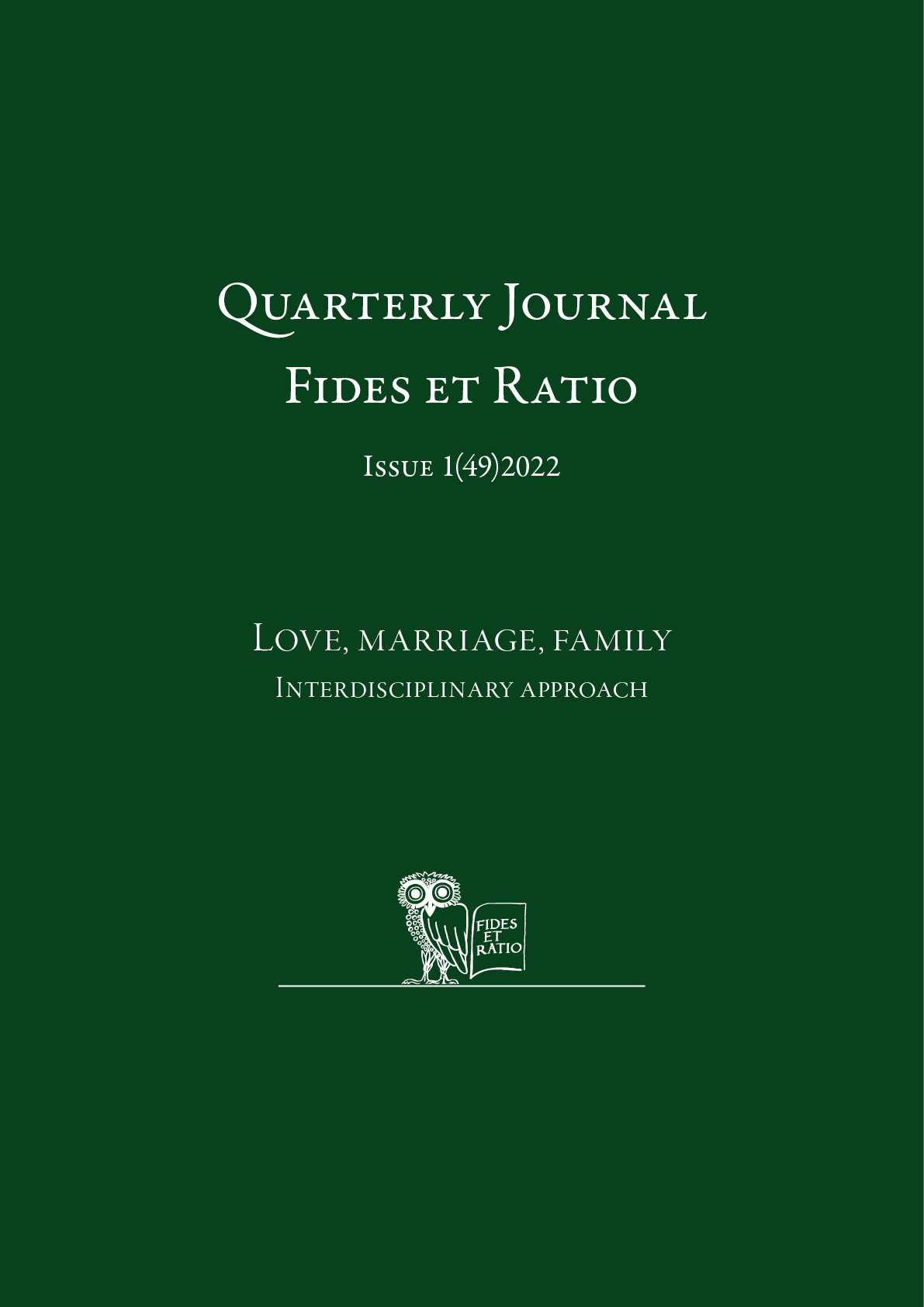Abstract
Reflection on caritas love and its relationship with wisdom requires understanding and knowing of the essence of Christian love, therefore this article discusses caritas love from the perspective of love in general and its connection with other gifts, especially with the gift of wisdom. To fully accept and realize the love of caritas one must first accept the truth about man, who was created in the image of the One God, in the image of the whole Trinity. To know the identity of man, Thomas argues, is to realize his vocation to friendship with God, to be a friend of God (Galuszka, 2021, p. 82). Arriving at the essence of the caritas love and its inseparable connection with wisdom, required a reflection on the meaning of one of the theological virtues, the virtue of love. Since the theological virtues are God's endowment of man, it was also necessary to introduce the gifts of the Holy Spirit to indicate the essence and fullness of the caritas love and its relation to God and men.
For this purpose, the thoughts of Saint Thomas of Aquinas were used, that seem to be more and more relevant and stirring more and more interest among people looking for truth and beautiful love.
Caritas love is beautiful because it consists of loving in God and with God also another human being, not necessarily the one endowed with affection or sympathy, but every human being. Such love can only be realized in the pursuit of an intimate encounter with God. The analysis of the known texts of St. Thomas allowed us to confirm the thesis on the relation between love and wisdom. Love is the principle of all virtues and the source of human action. Love enhances wisdom, it creates for itself this help. Love in its highest degree manifests itself in wisdom. The true union of love and wisdom results in contemplation, which is the result of the cooperation of intellect and will.
References
2. Gałuszka, T. (2021). Piękny Bóg, Piękny Człowiek. Zło z perspektywy teologii piękna Tomasza z Akwinu, Poznań: Wyd. W Drodze.
3. Giertych ,W. (2019). Wiara a uczucia, Warszawa: Wyd. Giertych.
4. Levering, M. (2016). Pismo Święte i Metafizyka. Tomasz z Akwinu i odnowa teologii Trynitarnej, Kraków: Dominikańska Biblioteka Teologii.
5. Pismo Święte Starego i Nowego Testamentu (1982), Poznań – Warszawa: Wydawnictwo Pallotinum.
6. Przanowski, M. (2015). Powołanie chrześcijańskiego mędrca, (w:) M. Przanowski (red.), Święty Tomasz z Akwinu o Bogu, Studia Teologiczne, (s. 27 – 51), Warszawa: Instytut Tomistyczny.
7. Przanowski, M. (2018). Uniżony Bóg w myśli św. Tomasza z Akwinu, Toruń: Wyd. Naukowe Uniwersytetu Mikołaja Kopernika.
8. Shanley, B. (2017). Tradycja Tomistyczna, t.VI., tłum. R. Mordarski, Warszawa: Instytut Tomistyczny.
9. Swieżawski, S. (1995). Święty Tomasz na nowo odczytany, Poznań: Wydawnictwo W Drodze.
10. Święty Tomasz z Akwinu, Suma teologiczna, przeł. P. Bełch, London 1966, Londyn: Katolicki Ośrodek Wydawniczy „Veritas”.
11. Święty Tomasz z Akwinu (2010). O cnotach rozumu, komentarz do VI księgi Etyki Nikomachejskiej Arystotelesa, Wrocław: Biblioteka Studiorum Philosophicorum Weatislaviensium.
12. Święty Tomasz z Akwinu (1994). O miłości nadprzyrodzonej, De Caritate, Warszawa: Wyd. Św. Tomasza z Akwinu.
13. Święty Tomasz z Akwinu – Summa contra gentiles Prawda wiary chrześcijańskiej w dyskusji z poganami, innowiercami i błądzącymi, t. I, Poznań: Wydawnictwo W Drodze.
14. Święty Tomasz z Akwinu (1998). Kwestie dyskutowane o prawdzie (De veritate), 2 tom, tłum. A. Aduszkiewicz, L. Kuczyński, J. Ruszczyński, Kety.
15. Święty Tomasz z Akwinu (2000). Traktat o cnotach, Kęty: Wyd. Antyk.
16. Święty Tomasz z Akwinu (2021). Traktat o Trójcy Świętej, Poznań - Warszawa - Kraków: Wyd. W Drodze.
17. Torrel, J-P. (2003). Święty Tomasz z Akwinu - mistrz duchowy, Poznań - Warszawa. W Drodze.
18. Torrell, J-P. (2008). Tomasz z Akwinu – Człowiek i dzieło, Warszawa: Instytut Tomistyczny.
19. Turner, D. (2017). Tomasz z Akwinu. Portret, Poznań: Wyd. W Drodze.
20. Włodek, Z. (2007). Wprowadzenie do Tomasz z Akwinu, Summa contra gentiles. Prawda wiary chrześcijańskiej w dyskusji z poganami, innowiercami i błądzącymi, Poznań: Wydawnictwo W Drodze.
21. Woroniecki, J. (2013). Katolicka Etyka Wychowawcza, Lublin: Wyd. KUL.

